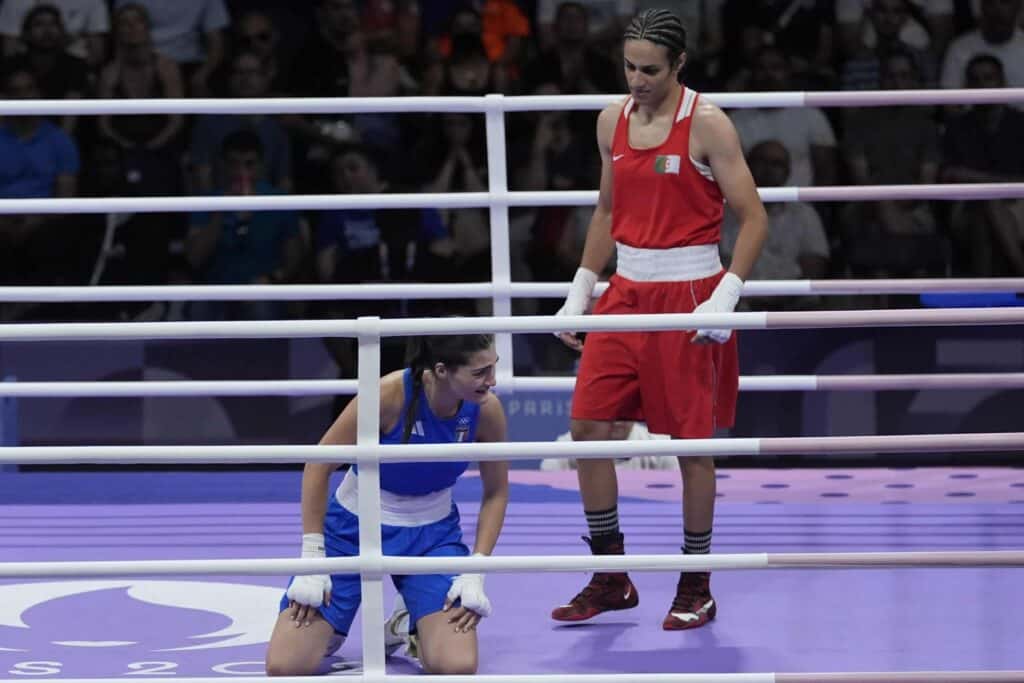
Algeria’s Imane Khelif, right, towers over a kneeling Angela Carini of Italy during their women’s 66kg preliminary boxing match at the 2024 Summer Olympics, Thursday, Aug. 1, 2024, in Paris, France. (AP Photo/John Locher)
CEBU CITY, Philippines— The gender controversy surrounding two Olympic female boxers has ignited a global debate, resonating far beyond the arenas of Paris.
In the Philippines, where boxing is a national passion, fans and experts are divided over the eligibility issues of Algerian Imane Khelif and Taiwan’s Lin Yu-ting. These athletes have sparked discussions about gender and fairness in a sport where speed, power, and physical attributes are crucial.
Reigning Philippine female light flyweight champion Althea Shine Pores of the PMI Bohol Boxing Stable supports Khelif and Ting’s right to compete.
Pores emphasizes that both athletes were biologically female at birth and passed the International Olympic Committee’s (IOC) screening. But that’s exactly where the gender controversy starts.
READ:
As gender row engulfs Paris Olympics boxing, what is testosterone?
Paris Olympics: Gender row explodes after Algerian boxer’s quick win
Cebuano first-timers strike gold medals in boxing
“I read Khelif’s post. She competed in the 2021 World Women’s Championships and faced protests, but she went on to win gold. She was born female. Despite the bashing, she’s a woman,” Pores said after her recent victory against Maria Theresa Pinili.
“For me, it’s okay to allow them to compete. Even if they change gender, they remain female.”
CALL FOR CLEARER POLICIES
International boxing judge Edward Ligas calls for the IOC to establish clear policies disallowing athletes with conditions like hermaphroditism, citing unfair physical advantages.
“Well, we cannot blame the boxer. She was properly screened by the committee and indeed she is female. The same case with Nancy Navalta, who has hermaphroditism, with intersex organs. It was totally unfair for true female boxers coz the Algerian has the power of a male which can easily overpower female boxers. The IOC should have a clear cut policy not to allow hermaphroditism athletes coz it will create an undue disadvantage to the other.,” Ligas explained.
SEEKING THE TRUTH
Veteran trainer and matchmaker Edito Villamor recognizes the complexity of Khelif and Ting’s cases. He believes policymakers must enforce rules ensuring fair competition between athletes of the same gender, supported by thorough screenings to avoid gender controversy.
“Female athletes should compete in any competition, amateur or professional, as long as they are proven female. Men and women have different strengths; they shouldn’t compete against each other,” Villamor stated.
“Why is there a difference in testosterone levels among these athletes? Are they using performance-enhancing drugs that aren’t detected? We can’t know from the outside, but inside the arena, we need transparency.”
A SEPARATE CATEGORY
Flag football player Katrina San Ramon suggests that trans male athletes should not compete with female athletes due to their physical advantages.
“As a female athlete, it’s unfair to let a trans male or female with genetic male traits compete with pure female athletes. Men are generally stronger and more agile. They should have a separate category to ensure fair competition,” San Ramon argued.
San Ramon highlights the significant advantages of trans male athletes in various sports, not just flag football. “They can jump higher and spike harder, even at the local level. I’m not saying they shouldn’t compete in the Olympics, but they should compete among themselves to maintain fairness.”
Read Next
Disclaimer: The comments uploaded on this site do not necessarily represent or reflect the views of management and owner of Cebudailynews. We reserve the right to exclude comments that we deem to be inconsistent with our editorial standards.

